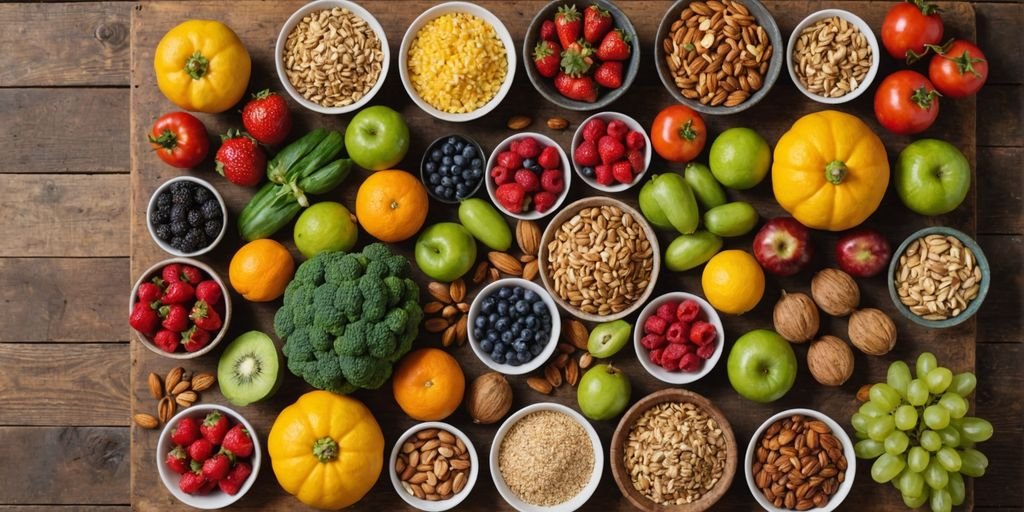Table of Contents
Eating holistic food can help you live a balanced and healthy life. This type of diet focuses on whole, unprocessed foods that nourish your body, mind, and spirit. By making mindful choices and understanding the origins of your food, you can improve your overall well-being.
Key Takeaways
Understanding Holistic Food
Definition and Core Principles
Holistic food is all about nourishing your body with nutrient-dense foods while also fostering a positive relationship with what you eat. The core principles include:
Difference from Conventional Diets
A holistic diet is different from conventional diets in several ways:
- 1. Focus on Whole Foods: Unlike conventional diets that may include processed foods, holistic eating emphasizes whole, unprocessed foods.
- 2. Mindful Eating Practices: Conventional diets often focus on calorie counting and portion control, while holistic eating encourages listening to your body’s needs and eating mindfully.
- 3. Holistic Approach: Holistic food considers the overall well-being, including mental and emotional health, not just physical health.
Importance of Whole Foods
Whole foods are essential in a holistic diet because they are packed with nutrients that support overall health. They help in:
Embracing holistic food can be a game-changer for those seeking a balanced, sustainable, and joyful way of living.
Health Benefits of Holistic Food
Disease Prevention
Holistic food can play a big role in keeping diseases at bay. Eating patterns centered around vegetables, fruits, legumes, whole grains, and healthy fats are shown to prevent conditions like obesity, diabetes, and heart problems. This approach looks at the root causes of illnesses and helps reduce risk factors.
Enhanced Digestion
Eating whole and natural foods can make your digestion better. When you eat mindfully and slowly, your body can break down food more easily. This can help reduce issues like bloating and constipation. Plus, you get to enjoy your meals more!
Boosted Energy Levels
Eating the right foods can give you more energy. Whole foods provide the nutrients your body needs to stay active and alert. This can make you feel more lively and ready to take on the day. It’s a great way to support your active health and overall well-being.
Holistic eating is not just about physical health but also about overall wellness. It includes mental, emotional, and spiritual aspects.
By focusing on whole, unprocessed foods, you can enjoy a balanced and joyful way of living.
Holistic Food and Mental Well-being
Reducing Stress and Anxiety
Holistic food can play a significant role in reducing stress and anxiety. By focusing on whole, unprocessed foods, you provide your body with the nutrients it needs to function optimally. Integrative health and wellness practices often include a diet rich in fruits, vegetables, and lean proteins, which can help stabilize your mood and reduce stress levels. Fermented foods, which include kimchi, yogurt, kefir, kombucha, and sauerkraut, may improve gut health and mood.
Improving Sleep Quality
A balanced diet that includes holistic foods can also improve your sleep quality. Foods rich in magnesium, such as leafy greens and nuts, can help relax your muscles and promote better sleep. Additionally, avoiding processed foods and sugars can prevent sleep disturbances, allowing you to wake up feeling refreshed and energized.
Enhancing Mental Clarity
Eating a diet focused on holistic foods can enhance your mental clarity. Whole foods provide essential nutrients that support brain health, leading to improved focus and cognitive function. This can be particularly beneficial for those who engage in activities that require a high level of concentration, such as studying or working on complex projects. A healthy mindset is crucial for maintaining mental clarity and overall well-being.
Incorporating holistic foods into your diet can be a game-changer for your mental well-being. By making mindful choices, you can reduce stress, improve sleep, and enhance mental clarity, leading to a more balanced and fulfilling life.
Practical Tips for Incorporating Holistic Food
Starting with Small Changes
Transitioning to a holistic diet doesn’t have to be overwhelming. Begin with small, manageable changes. For instance, you can start by making one meal a day more holistic. Choose fresh ingredients, practice mindful eating, and notice how you feel afterward. Gradually, you can incorporate these practices into all your meals.
Mindful Eating Practices
Mindful eating is a core principle of holistic food. Pay attention to what you eat, savor each bite, and appreciate the nourishment it provides. This practice not only improves digestion but also helps you connect with your food. Aim to incorporate a variety of food groups into your meals, including fruits, vegetables, whole grains, lean proteins, and healthy fats.
Experimenting with Recipes
Eating holistically doesn’t mean your meals have to be boring. Get creative in the kitchen by experimenting with different herbs, spices, and cooking methods. Try new recipes and cuisines to expand your palate. This can make meals more flavorful and enjoyable, making it easier to stick to a holistic diet.
Embracing holistic food is a journey, not a destination. Small changes can lead to big improvements in your overall health and wellness.
Holistic Food for Different Life Stages

Holistic Nutrition for Children
Children need a diet rich in fruits, vegetables, lean proteins, whole grains, and healthy fats. Prioritizing a diet rich in these foods helps in their growth and development. Avoiding processed foods, saturated fats, and added sugars is crucial.
Holistic Eating During Pregnancy
Pregnant women should focus on nutrient-dense foods to support their health and the baby’s development. Whole foods like leafy greens, nuts, seeds, and lean proteins are essential. Staying hydrated and avoiding processed foods is also important.
Holistic Food for Seniors
For seniors, a balanced diet can help maintain energy levels and prevent diseases. Foods rich in fiber, vitamins, and minerals are key. It’s also important to stay hydrated and limit the intake of processed foods and sugars.
A holistic diet can be a game-changer for those seeking a balanced, sustainable, and joyful way of living.
By focusing on whole, unprocessed foods, individuals at different life stages can enjoy better health and well-being.
Connecting with Your Food

Knowing Your Food’s Origin
Understanding where your food comes from is a key part of holistic eating. By identifying where your food comes from, you can develop a greater appreciation for it. This connection can encourage healthier choices and a greater appreciation for nourishing foods.
Building a Relationship with Local Farmers
Connecting with local farmers can deepen your relationship with your food. Visiting farmers’ markets or even local farms can help you learn more about how your food is grown. This not only supports local agriculture but also helps you make more informed choices about what you eat.
Growing Your Own Food
Growing your own food can be a rewarding experience. It allows you to understand the effort that goes into producing the food you eat. Plus, it can be a fun and educational activity for the whole family. Even a small garden can provide fresh, nutritious produce and a sense of accomplishment.
Developing a sincere connection to your food producers can improve your relationship with food and its ability to power your body.
Common Misconceptions About Holistic Food
Holistic Food is Expensive
Many people think that eating holistic food is costly. However, this isn’t always true. Buying seasonal and local produce can actually save money. Plus, cooking at home with whole foods can be cheaper than eating out or buying processed foods.
Holistic Eating is Time-Consuming
Another myth is that holistic eating takes too much time. While it might require some planning, it doesn’t have to be overwhelming. Simple meals like salads, stir-fries, and smoothies can be quick and nutritious. Batch cooking and meal prepping can also save time during the week.
Holistic Food Lacks Flavor
Some believe that holistic food is bland. On the contrary, using fresh herbs, spices, and natural ingredients can make meals very tasty. Experimenting with different recipes can reveal how delicious holistic food can be.
Holistic food is not just about health; it’s about enjoying what you eat and feeling good about it.
Holistic eating is about making mindful choices that benefit your body and mind. Don’t let these misconceptions stop you from exploring a healthier lifestyle.
Conclusion
In conclusion, embracing a holistic diet can be a transformative step towards a balanced and fulfilling lifestyle. By focusing on whole, unprocessed foods and listening to your body’s needs, you can improve your physical health, boost your energy levels, and enhance your mental well-being. This approach not only helps prevent diseases but also reduces cravings and improves sleep. Remember, holistic eating is a journey that evolves with you, encouraging mindfulness and a deeper connection to your food. Start small, make mindful choices, and enjoy the positive changes that come with a holistic approach to nutrition.
Frequently Asked Questions
What is holistic food?
Holistic food focuses on whole, natural, and unprocessed foods. It aims to nourish the body, mind, and spirit by choosing foods that are as close to their natural state as possible.
How does holistic food differ from a regular diet?
Unlike regular diets that often focus on calorie counting or specific nutrients, holistic food emphasizes overall well-being. It includes eating whole foods, mindful eating practices, and understanding the origin of your food.
Can holistic food help prevent diseases?
Yes, a holistic diet can help prevent diseases. Eating patterns rich in vegetables, fruits, whole grains, and healthy fats can reduce the risk of conditions like obesity, diabetes, and heart disease.
Is holistic food expensive?
Not necessarily. While some holistic foods can be pricier, there are many affordable options. Buying seasonal produce, shopping at local markets, and growing your own food can help keep costs down.
Does holistic eating take a lot of time?
Holistic eating doesn’t have to be time-consuming. Simple changes like incorporating more whole foods, practicing mindful eating, and planning meals can make it easier to adopt a holistic diet without spending too much time.
Is holistic food tasty?
Absolutely! Holistic food can be very flavorful. Using fresh ingredients, experimenting with herbs and spices, and trying new recipes can make holistic meals delicious and enjoyable.













Leave a Review